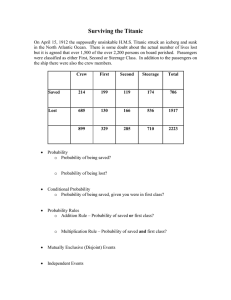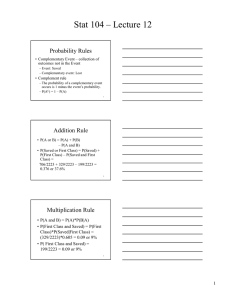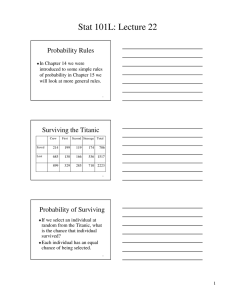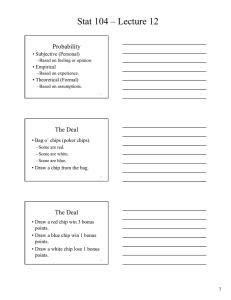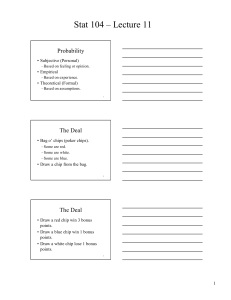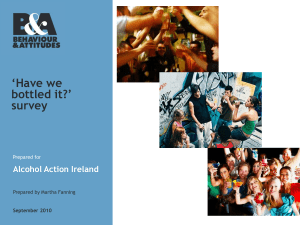Probability Rules
advertisement
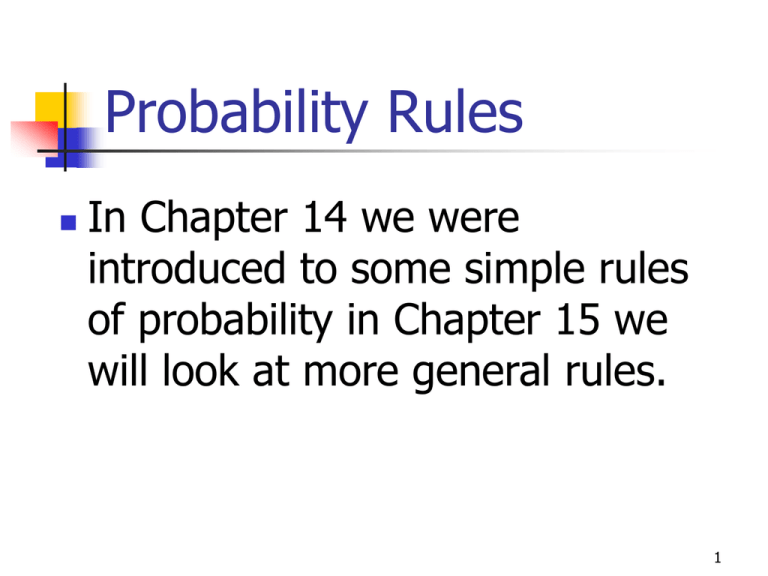
Probability Rules In Chapter 14 we were introduced to some simple rules of probability in Chapter 15 we will look at more general rules. 1 Surviving the Titanic Crew First Second Steerage Total Saved 214 199 119 174 706 Lost 685 130 166 536 1517 899 329 285 710 2223 2 Probability of Surviving If we select an individual at random from the Titanic, what is the chance that individual survived? Each individual has an equal chance of being selected. 3 Formal Probability # of outcomes in Event P Event Total # of outcomes 4 Probability of survival Probability individual selected was saved 706/2223=0.318 or 31.8% Probability individual selected was lost 1517/2223=0.682 or 68.2% 5 General Addition Rule P(A or B) = P(A) + P(B) – P(A and B) P(Saved or First Class) = P(Saved) + P(First Class) – P(Saved and First Class) = 706/2223 + 329/2223 – 199/2223 = 0.376 or 37.6% 6 Special Addition Rule Disjoint (mutually exclusive) events – no outcomes in common. P(A and B) = 0 Addition Rule for disjoint events. P(A or B) = P(A) + P(B) P(First or Second) = P(First) + P(Second) = 329/2223 + 285/2223 = 614/2223 = 0.276 or 27.6% 7 Conditional Probability Probability relative to a preexisting condition. P(A|B): The probability of A occurring, given B has already occurred. 8 Conditional Probability P(Saved|First Class)=number of First Class who were saved relative to the total number of First Class passengers P(Saved|First Class) = 199/329 = 0.605 or 60.5%. 9 General Multiplication Rule P(A and B) = P(A)*P(B|A) P(First Class and Saved) = P(First Class)*P(Saved|First Class) = (329/2223)*0.605 = 0.09 or 9% P(First Class and Saved) = 199/2223 = 0.09 or 9% 10 Independent Events Two events are independent if the probability of the occurrence of one event does not effect nor is it affected by the occurrence of the other event. P(A) = P(A|B) = P(A|BC) 11 Not independent events Saved and First Class are not independent events because: P(Saved) = 0.318 P(Saved|First Class) = 0.605 The two probabilities are not equal. 12 Independent Trials Sampling with replacement creates independent trials. P(Red on 1st and Red on 2nd)= P(Red on 1st)P(Red on 2nd) 13 Dependent Trials Sampling without replacement creates dependent trials. P(Red on 1st and Red on 2nd)= P(Red on 1st)P(Red on 2nd|Red on 1st) 14 Tree diagram 1st Trial Red White Blue 2nd Trial Red White Blue Red White Blue Red White Blue 15
